#network;post
Text

in honor of jeonnguk’s birthday we have put together some of the fics of our members for you to enjoy right in one masterlist. happy reading and happy birthday to jeon jeongguk.
please note. we only compiled a few fics as the quantity that has been reblogged on this network for jeongguk is too much to include in one post. with that being said, do not hesitate to look through our tags by searching for m;jeongguk.

K E Y:
fluff [❀] | angst [♛] | smut [❦] | series [✎] | oneshot [✓] | drabble [⊕]

coquet | ❀ ♛ ❦ ✎
On your brother's wedding, you dread traveling to see your family–whom you have successfully avoided for over a year after moving across the country for work. In an effort to save face, you hire an escort to get them off your back and perhaps even make your ex–who happens to be the best man–a little jealous. — Sincerely, @shina913
memories | ❀ ♛ ✓
in which moving on completely from your ex-boyfriend turns to be extremely difficult, especially when he suddenly shows up on your doorstep, asking to spend the night. — Sincerely, @pjmsdior
as it was | ❀ ⊕
on a sweet autumn noon with you in his lap and his heart in your palm, jungkook thinks he might finally have it all. — Sincerely, @ditttiii
the damsel & her knight | ❀ ♛ ✎
Extraordinarily intelligent, really handsome but insincere as heck, Jeon Jungkook is your childhood enemy, the Chairman's son, the apple of your parents’ eye and now also a co-worker that you are forced to rescue out of sticky situations every other day. You fear it is only a matter of time before he has you entangled in his mess as well. — Sincerely, @jimilter
silent gym buddy | ❀ ⊕
Trying out a new gym really can be a series of trial and error, but something about the cute guy who's always working out near you keeps you coming back day after day. — Sincerely, @dntaewithluv
our beloved summer | ❀ ♛ ❦ ✎
You made a vow to hate Jeon Jungkook ever since he packed up and left you without a single explanation, but when he shows up at your door after years of radio silence, it turns out that maybe your resolve isn’t as strong as you thought. — Sincerely, @jeonqkooks
officially yours | ❀ ❦ ✓
you're his and he is yours on the paper – but what is the reality? — Sincerely, @personasintro
at the end of the day | ❀ ♛ ❦ ✓
You and Jungkook have been best friends for 8 years, going through absolute hell and back together. After senior year of high school, you and Jungkook began a tradition of taking annual vacations together during the summer months. This summer is no different, with you and Jungkook celebrating graduating college just a couple months prior. You're set to move to NYC after the summer, with you and Jungkook soaking in the sun and as many moments as you can together. You'd think nothing could ever tear your friendship apart with him, but when you've sat on the beach for too many days in a row watching him surf, you can't help but wonder - when did your best friend get so hot? — Sincerely, @starshapedkookie

These are only a few of the many fics that we have reblogged to our network! Thank you to all of the amazing writers who create such beautiful stories!
— Cafe Admins
461 notes
·
View notes
Text
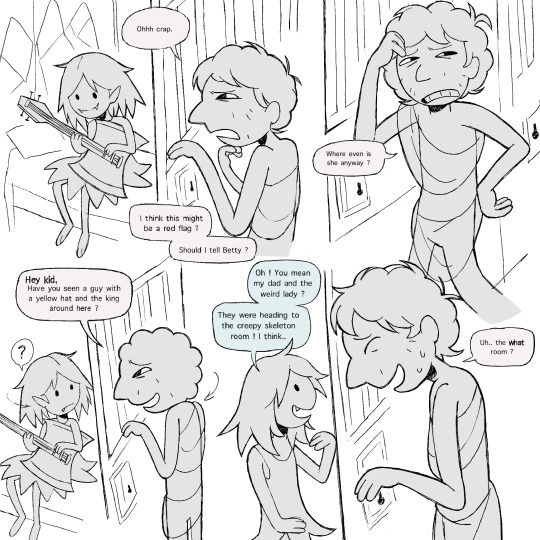

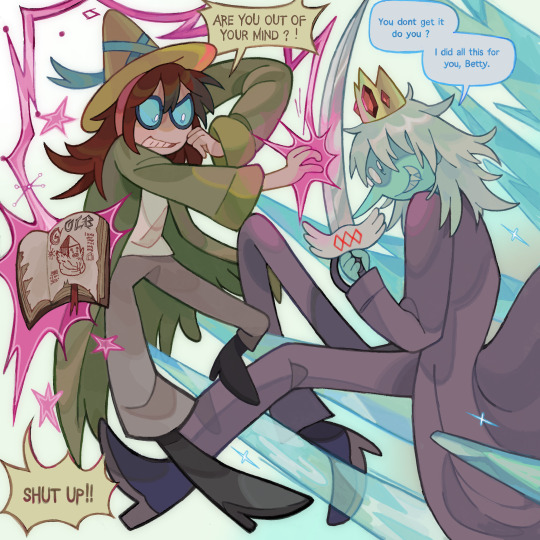
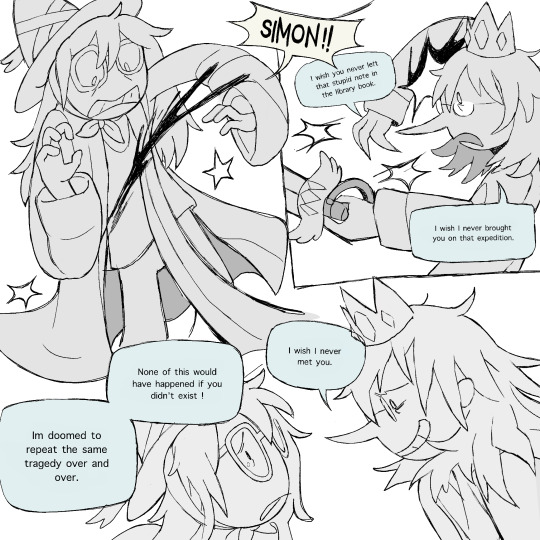



PT 3
Bonus page.
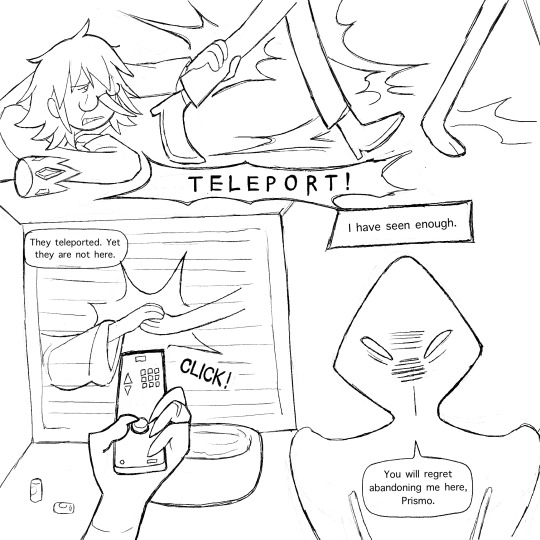
Yes, this is a different universe than canon WK. I will never let Betty catch a break. Happens after the events of the Vampire World. The fight scene was supposed to be longer But I am not drawing all that. Theres one last world left.
At some point there will be a master-post with the lore in order.
#Forbidden Dream AU#adventure time#fionna and cake#betty grof#au#petrigrof violence#dumb angst#winter king#simon petrikov#headcanon#prismo the wishmaster#petrigrof#human prismo#comic#long post#cartoon network#flame princess#candy queen#princess bubblegum
3K notes
·
View notes
Text
Regular Show humanized because why not

#art#artwork#silly stuff#regular show#eileen regular show#mordecai regular show#regular show rigby#mordecai and rigby#cartoon network#sorry for not posting for like a month
573 notes
·
View notes
Text
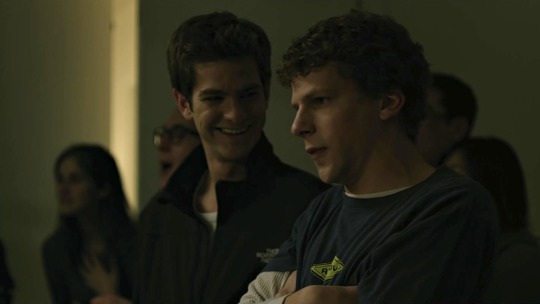
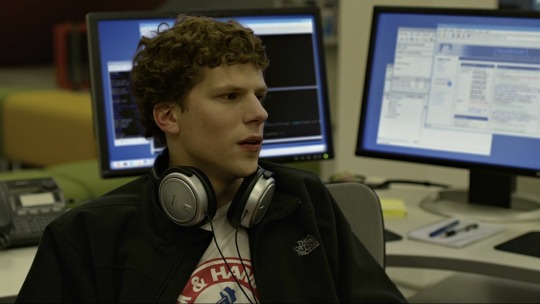






little beast, richard siken + the social network (2010) dir david fincher // challengers (2024) dir luca guadagnino // saltburn (2023) dir emerald fennell
#want to make a little beast post for challengers with more caps when it drops#maybe even one for each part 🧍🏻#…#but made this in the meantime#+ tashi ofc#challengers#challengers 2024#challengers movie#challengersedit#tsnedit#the social network#tsn#saltburn#saltburn 2023#saltburnedit#art x patrick#patrick zweig#oliver x felix#cattonquick#felix x oliver#markwardo#*#comparatives#web weaving#richard siken
485 notes
·
View notes
Text
May 5th, Israel bans the news network Al Jazeera...

Posts from aljazeeraenglish on instagram
statement
video
#al jazeera#free palestine#al jazeera banned#fuck israel#no freedom of press#gaza#current events#may 5th#news network#going to post another video from their instagram here in a minute
411 notes
·
View notes
Text
This photo is how it feels when you are about to talk about your hyperfixation to friends/family

#puppet history#i got the power point ready#watcher network#the watcher network#shane madej#ryan bergara#ant posts stuff
6K notes
·
View notes
Text



Pull yourself TOGETHER man
#panel one that's ritsu and serizawa assisting mob. just btw#who is mob marrying? well... who knows ...#for real though expanding on post canon is so real to ME#because of mob psychos central idea of growing up and getting older and life moving on#like it makes my heart warm to know these kids will GROW UP and GET JOBS and MEET PEOPLE IMPORTANT TO TJEM#and maybe even get married !...#i do think Reigen doesnt often think abt how far they've all come until some sort of big milestone#like a wedding or someone buys a house or graduates from school and etc#and then he's like damn.... ive really known him since he was a lil kid. and here we are now#excuse my rambling im just so sick and crazy and it makes my heart warm#mp100#my rart#shigeo kageyama#reigen arataka#mob psycho 100#ritsu kageyama#serizawa katsuya#their network of psychics and friends all chip in to help at the wedding
3K notes
·
View notes
Text
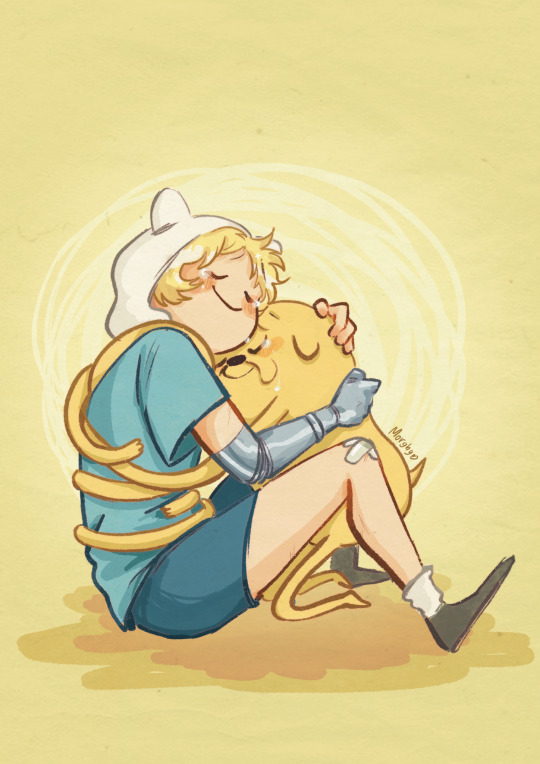
⭐️You and i will always be best friends⭐️
#pretty old but i somehow never posted it? so enjoy!#adventure time#finn and jake#finn the human#jake the dog#fanart#my art#art#achieve the sun#digital art#morghy#procreate#artists on tumblr#digital drawing#cartoon network
1K notes
·
View notes
Text
Social Quitting

In “Social Quitting,” my latest Locus Magazine column, I advance a theory to explain the precipitous vibe shift in how many of us view the once-dominant social media platforms, Facebook and Twitter, and how it is that we have so quickly gone asking what we can do to get these services out of our lives to where we should go now that we’re all ready to leave them:
https://locusmag.com/2023/01/commentary-cory-doctorow-social-quitting/
The core of the argument revolves around surpluses — that is, the value that exists in the service. For a user, surpluses are things like “being able to converse with your friends” and “being able to plan activities with your friends.” For advertisers, surpluses are things like “being able to target ads based on the extraction and processing of private user data” and “being able to force users to look at ads before they can talk to one another.”
For the platforms, surpluses are things like, “Being able to force advertisers and business customers to monetize their offerings through the platform, blocking rivals like Onlyfans, Patreon, Netflix, Amazon, etc” and things like “Being able to charge more for ads” and “being able to clone your business customers’ products and then switch your users to the in-house version.”
Platforms control most of the surplus-allocating options. They can tune your feed so that it mostly consists of media and text from people you explicitly chose to follow, or so that it consists of ads, sponsored posts, or posts they think will “boost engagement” by sinking you into a dismal clickhole. They can made ads skippable or unskippable. They can block posts with links to rival sites to force their business customers to transact within their platform, so they can skim fat commissions every time money changes hands and so that they can glean market intelligence about which of their business customers’ products they should clone and displace.
But platforms can’t just allocate surpluses will-ye or nill-ye. No one would join a brand-new platform whose sales-pitch was, “No matter who you follow, we’ll show you other stuff; there will be lots of ads that you can’t skip; we will spy on you a lot.” Likewise, no one would sign up to advertise or sell services on a platform whose pitch was “Our ads are really expensive. Any business you transact has to go through us, and we’ll take all your profits in junk fees. This also lets us clone you and put you out of business.”
Instead, platforms have to carefully shift their surpluses around: first they have to lure in users, who will attract business customers, who will generate the fat cash surpluses that can be creamed off for the platforms’ investors. All of this has to be orchestrated to lock in each group, so that they won’t go elsewhere when the service is enshittified as it processes through its life-cycle.
This is where network effects and switching costs come into play. A service has “network effects” if it gets more valuable as users join it. You joined Twitter to talk to the people who were already using it, and then other people joined so they could talk to you.
“Switching costs” are what you have to give up when you leave a service: if a service is siloed — if it blocks interoperability with rivals — then quitting that service means giving up access to the people whom you left behind. This is the single most important difference between ActivityPub-based Fediverse services like Mastodon and the silos like Twitter and Facebook — you can quit a Fediverse server and set up somewhere else, and still maintain your follows and followers:
https://pluralistic.net/2022/12/23/semipermeable-membranes/#free-as-in-puppies
In the absence of interoperability, network effects impose their own switching cost: the “collective action problem” of deciding when to leave and where to go. If you depend on the people you follow and who follow you — for emotional support, for your livelihood, for community — then the extreme difficulty of convincing everyone to leave at the same time and go somewhere else means that you can be enticed into staying on a service that you no longer enjoy. The platforms can shift the surpluses away from you, provided that doing so makes you less miserable than abandoning your friends or fans or customers would. This is the Fiddler On the Roof problem: everyone stays put in the shtetl even though the cossacks ride through on the reg and beat the shit out of them, because they can’t all agree on where to go if they leave:
https://doctorow.medium.com/how-to-leave-dying-social-media-platforms-9fc550fe5abf
So the first stage of the platform lifecycle is luring in users by allocating lots of surplus to them — making the service fun and great and satisfying to use. Few or no ads, little or no overt data-collection, feeds that emphasize the people you want to hear from, not the people willing to pay to reach you.
This continues until the service attains a critical mass: once it becomes impossible to, say, enroll your kid in a little-league baseball team without having a Facebook account, then Facebook can start shifting its surpluses to advertisers and other business-users of the platform, who will pay Facebook to interpose themselves in your use of the platform. You’ll hate it, but you won’t leave. Junior loves little-league.
Facebook can enshittify its user experience because the users are now locked in, holding each other hostage. If Facebook can use the courts and technological countermeasures to block interoperable services, it can increase its users’ switching costs, producing more opportunities for lucrative enshittification without the risk of losing the users that make Facebook valuable to advertisers. That’s why Facebook pioneered so many legal tactics for criminalizing interoperability:
https://www.eff.org/cases/facebook-v-power-ventures
This is the second phase of the toxic platform life-cycle: luring in business customers by shifting surpluses from users to advertisers, sellers, etc. This is the moment when the platforms offer cheap and easy monetization, low transaction fees, few barriers to off-platform monetization, etc. This is when, for example, a news organization can tease an article on its website with an off-platform link, luring users to click through and see the ads it controls.
Because Facebook has locked in its users through mutual hostage-taking, it can pollute their feeds with lots of these posts to news organizations’ sites, bumping down the messages from its users’ friends, and that means that Facebook can selectively tune how much traffic it gives to different kinds of business customers. If Facebook wants to lure in sports sites, it can cram those sites’ posts into millions of users’ feeds and send floods of traffic to sports outlets.
Outlets that don’t participate in Facebook lose out, and so they join Facebook, start shoveling their content into it, hiring SEO Kremlinologists to help them figure out how to please The Algorithm, in hopes of gaining a permanent, durable source of readers (and thus revenue) for their site.
But ironically, once a critical mass of sports sites are on Facebook, Facebook no longer needs to prioritize sports sites in its users’ feeds. Now that the sports sites all believe that a Facebook presence is a competitive necessity, they will hold each other hostage there, egging each other on to put more things on Facebook, even as the traffic dwindles.
Once sports sites have taken each other hostage, Facebook can claw back the surplus it allocated to them and use it to rope in another sector — health sites, casual games, employment seekers, financial advisors, etc etc. Each group is ensnared by a similar dynamic to the one that locks in the users.
But there is a difference between users’ surpluses and business’s surpluses. A user’s surplus is attention, and there is no such thing as an “attention economy.” You can’t use attention to pay for data-centers, or executive bonuses, or to lobby Congress. Attention is not a currency in the same way that cryptos are not currency — it is not a store of value, nor a unit of exchange, nor or a unit of account.
Turning attention into money requires the same tactics as turning crypto into money — you have to lure in people who have real, actual money and convince them to swap it for attention. With crypto, this involved paying Larry David, Matt Damon, Spike Lee and LeBron James to lie about crypto’s future in order to rope in suckers who would swap their perfectly cromulent “fiat” money for unspendable crypto tokens.
With platforms, you need to bring in business customers who get paid in actual cash and convince them to give you that cash in exchange for ethereal, fast-evaporating, inconstant, unmeasurable “attention.” This works like any Ponzi scheme (that is, it works like cryptos): you can use your shareholders’ cash to pay short-term returns to business customers, losing a little money as a convincer that brings in more trade.
That’s what Facebook did when it sent enormous amounts of traffic to a select few news-sites that fell for the pivot to video fraud, in order to convince their competitors to borrow billions of dollars to finance Facebook’s bid to compete with Youtube:
https://doctorow.medium.com/metaverse-means-pivot-to-video-adbe09319038
This convincer strategy is found in every con. If you go to the county fair, you’ll see some poor bastard walking around all day with a giant teddy bear that he “won” by throwing three balls into a peach-basket. The carny who operated that midway game let him win the teddy precisely so that he would walk around all day, advertising the game, which is rigged so that no one else wins the giant teddy-bear:
https://boingboing.net/2006/08/27/rigged-carny-game.html
Social media platforms can allocate giant teddy-bears to business-customers, and it can also withdraw them at will. Careful allocations mean that the platform can rope in a critical mass of business customers and then begin the final phase of its life-cycle: allocating surpluses to its shareholders.
We know what this looks like.
Rigged ad-markets:
https://en.wikipedia.org/wiki/Jedi_Blue
Understaffed content moderation departments:
https://www.dw.com/en/twitters-sacking-of-content-moderators-will-backfire-experts-warn/a-63778330
Knock-off products:
https://techcrunch.com/2021/12/08/twitter-is-the-latest-platform-to-test-a-tiktok-copycat-feature/
Nuking “trust and safety”:
https://www.reuters.com/technology/twitter-dissolves-trust-safety-council-2022-12-13/
Hiding posts that have links to rival services:
https://www.makeuseof.com/content-types-facebook-hides-why/
Or blocking posts that link to rival services:
https://pluralistic.net/2022/12/19/better-failure/#let-my-tweeters-go
Or worse, terminating accounts for linking to rival services:
https://blog.joinmastodon.org/2022/12/twitter-suspends-mastodon-account-prevents-sharing-links/
That is, once a platform has its users locked in, and has its business customers locked in, it can enshittify its service to the point of near uselessness without losing either, allocating all the useful surplus in the business to its shareholders.
But this strategy has a problem: users and business customers don’t like to be locked in! They will constantly try to find ways to de-enshittify your service and/or leave for greener pastures. And being at war with your users and business customers means that your reputation continuously declines, because every time a user or business customer figures out a way to claw back some surplus, you have to visibly, obviously enshittify your service wrestle it back.
Every time a service makes headlines for blocking an ad-blocker, or increasing its transaction fees, or screwing over its users or business customers in some other way, it makes the case that the price you pay for using the service is not worth the value it delivers.
In other words, the platforms try to establish an equilibrium where they only leave business customers and users with the absolute bare minimum needed to keep them on the service, and extract the rest for their shareholders. But this is a very brittle equilibrium, because the prices that platforms impose on their users and business customers can change very quickly, even if the platforms don’t do anything differently.
Users and business customers can revalue the privacy costs, or the risks of staying on the platform based on exogenous factors. Privacy scandals and other ruptures can make the cost you’ve been paying for years seem higher than you realized and no longer worth it.
This problem isn’t unique to social media platforms, either. It’s endemic to end-stage capitalism, where companies can go on for years paying their workers just barely enough to survive (or even less, expecting them to get public assistance and/or a side-hustle), and those workers can tolerate it, and tolerate it, and tolerate it — until one day, they stop.
The Great Resignation, Quiet Quitting, the mass desertions from the gig economy — they all prove the Stein’s Law: “Anything that can’t go on forever will eventually stop.”
Same for long, brittle supply-chains, where all the surplus has been squeezed out: concentrating all the microchip production in China and Taiwan, all the medical saline in Puerto Rico, all the shipping into three cartels… This strategy works well, and can be perfectly tuned with mathematical models that cut right to the joint, and they work and they work.
Until they stop. Until covid. Or war. Or wildfires. Or floods. Or interest rate hikes. Or revolution. All this stuff works great until you wake up and discover that the delicate balance between paying for guard labor and paying for a fair society has tilted, and now there’s a mob building a guillotine outside the gates of your luxury compound.
This is the force underpinning collapse: “slow at first, then all at once.” A steady erosion of the failsafes, flensing all the slack out of the system, extracting all the surpluses until there’s nothing left in the reservoir, no reason to stay.
It’s what caused the near-collapse of Barnes and Noble, and while there are plenty of ways to describe James Daunt’s successful turnaround, the most general characterization is, “He has reallocated the company’s surpluses to workers, readers, writers and publishers”:
https://tedgioia.substack.com/p/what-can-we-learn-from-barnes-and
A system can never truly stabilize. This is why utopias are nonsense: even if you design the most perfect society in which everything works brilliantly, it will still have to cope with war and meteors and pandemics and other factors beyond your control. A system can’t just work well, it has to fail well.
This is why I object so strenuously to people who characterize my 2017 novel Walkaway as a “dystopian novel.” Yes, the protagonists are eking out survival amidst a climate emergency and a failing state, but they aren’t giving up, they’re building something new:
https://locusmag.com/2017/06/bruce-sterling-reviews-cory-doctorow/
“Dystopia” isn’t when things go wrong. Assuming nothing will go wrong doesn’t make you an optimist, it makes you an asshole. A dangerous asshole. Assuming nothing will go wrong is why they didn’t put enough lifeboats on the Titanic. Dystopia isn’t where things go wrong. Dystopia is when things go wrong, and nothing can be done about it.
Anything that can’t go on forever will eventually stop. The social media barons who reeled users and business customers into a mutual hostage-taking were confident that their self-licking ice-cream cone — in which we all continued to energetically produce surpluses for them to harvest, because we couldn’t afford to leave — would last forever.
They were wrong. The important thing about the Fediverse isn’t that it’s noncommercial or decentralized — it’s that its design impedes surplus harvesting. The Fediverse is designed to keep switching costs as low as possible, by enshrining the Right Of Exit into the technical architecture of the system. The ability to leave a service without paying a price is the best defense we have against the scourge of enshittification.
(Thanks to Tim Harford for inspiring this column via an offhand remark in his kitchen a couple months ago!)
[Image ID: The Phillip Medhurst Picture Torah 397. The Israelites collect manna. Exodus cap 16 v 14. Luyken and son.]
#pluralistic#social media#post-twitter#post-facebook#switching costs#network effects#web theory#locus magazine#exodus#decentralization
3K notes
·
View notes
Text
How can people watch a piece of media and not immediately try to look at it through the lense of homosexuality and forbidden desires…. How….. It must be so boring, watching a movie and seeing two main characters hit it off but theyre not canonically in love so you dont think anything of it…. Very foreign to me, i dont understand it at all…
#first tag bout to hit some of yall like a brick#markwardo#tsn#the social network#marvey#suits tv#jackieshauna#yellowjackets#theres more i just cant think rn#text post
474 notes
·
View notes
Text








Cartoon Network Emojis
#cartoon network#adventure time#the amazing world of gumball#courage the cowardly dog#we bare bears#steven universe#regular show#summer camp island#powerpuff girls#craig of the creek#scooby doo#my own post
506 notes
·
View notes
Text
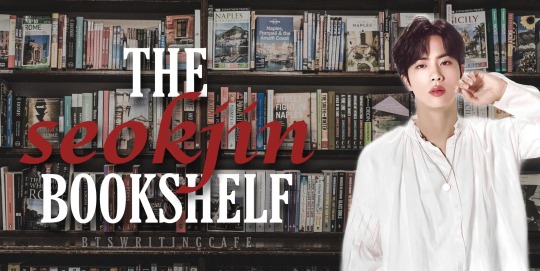
in honor of seokjin’s birthday we have put together some of the fics of our members for you to enjoy right in one masterlist. happy reading and happy birthday to kim seokjin.
please note. we only compiled a few fics as the quantity that has been reblogged on this network for seokjin is too much to include in one post. with that being said, do not hesitate to look through our tags by searching for m;seokjin.

K E Y
fluff [❀] | angst [♛] | smut [❦] | series [✎] | oneshot [✓] | drabble [⊕]

the heart of a demon | ❀ ♛ ✓
— @meirkive
“Your roommate just wanted to revive her plants, so how come you have a forked-tongue demon in your kitchen, now?”
serve me | ❀ ♛ ❦ ✓
— @chateautae
kim seokjin has been your annoyingly stoic butler ever since you started university, and were gifted your own penthouse. for years, your relationship had remained on the outs, subjecting seokjin to hearing your desperate moans for other men each time they climbed into your sheets; and each time you rubbed it in his face. little did you know that you were only riling him up, and it would be your moans for him bouncing off the walls when your taunting finally unravels his ironclad self-control.
the truth untold | ❀ ♛ ❦ ✓
— @vminity21
When a job opportunity arises in the hometown you left seven years ago, you return with the gift that was never made known to the one person who hasn't left your mind. Despite the love interest tugging on your heartstrings, you wonder where he may be; tired of suppressing the guilt for hiding the biggest secret you have ever withheld. Now, after all this time, the truth is approaching much sooner than you anticipate, and the untold story of why you left will soon be revealed.
the astronaut | ❀ ⊕
— @herecomesjoon
Jin has a precious secret that he finally wants to share with the world.
forty seven steps | ❀ ⊕
— @moonbeamjin
seokjin thinks he’s decent at building things. well, he’s never met an ikea storage bed.
kishotenketsu | ❀ ♛ ✎
— @vyduan
Based on the Chinese/Japanese/Korean narrative story arc of qǐ chéng zhuǎn hé (起承轉合), this series follows Kim Seokjin, the emptyheaded heir of Kim Industries. Part absurd, part light angst, who knows what sorts of escapades in which Seokjin will entangle himself? Good thing you are the even keel to his flighty sails.Good thing for Seokjin. Terrible thing for you.

Thank you to all of our members for always creating such wonderful content!
88 notes
·
View notes
Text
Amnesia fox and ice grandpa go on an adventure.




Next morning.
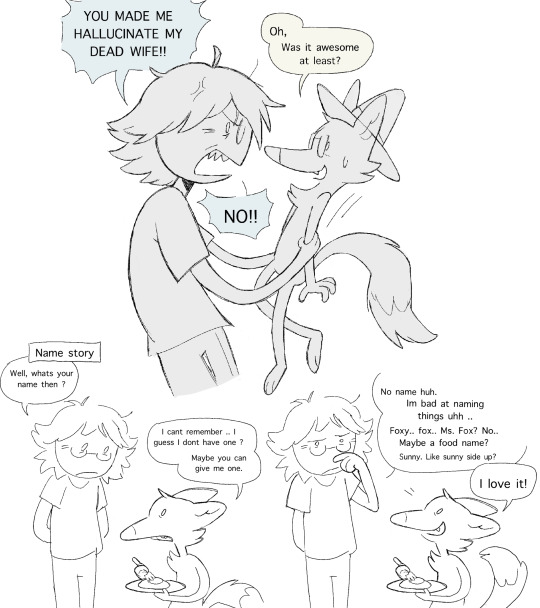
Bonus page:
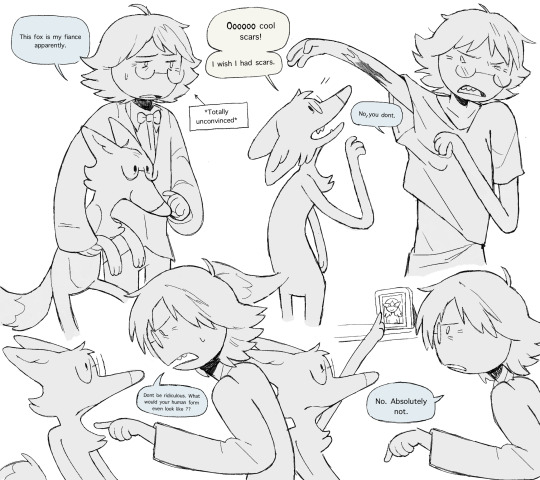
#petrigrof#forbidden dream au#fionna and cake#adventure time#simon petrikov#betty grof#fanart#au#headcanon#post f&c#cartoon network#comic
1K notes
·
View notes
Text
me and den @unloneliest were just talking about murderbot and ART's relationship and i want to discuss how they quite literally complete each other's sensory and emotional experience of the world!!
there's a few great posts on here such as this one about how murderbot uses drones to fully and properly experience the world around it (it also accesses security cameras/other systems for this same purpose). but i haven't seen anyone so far talk about how once MB stops working for the company and consequently doesn't have a hubsystem/secsystem to connect to anymore (which for its entire existence up to that point had been how it was used to interacting with its environment/doing its job), after it meets ART, ART starts to fill that gap.
ART gives MB access to more cameras, systems, and information archives than it would normally be able to connect with while MB is on its own outside of ART's... body(? lol), but also directly gives MB access to its own cameras, drones, archives, facilities, and processing space. additionally, so much of ART's function is dedicated to analysis, lateral thinking, and logical reasoning, and it not only uses those skills in service of reaching murderbot's goals, it teaches murderbot how to use those same skills. (ART might be a bit of an asshole about how it does this, but that doesn't negate just how much it does for murderbot for no reason other than it's bored/interested in MB as an individual.)
we all love goofing about how artificial condition can basically be boiled down to "two robots in a trench coat trying to get through a job interview" (which is entirely accurate tbh) but that's also such a great example of ART fulfilling the role of both murderbot's "hubsystem" and "secsystem", allowing it to fully experience its environment/ succeed in its goals. ART provides MB with crucial information, context, and constructive criticism, and uses its significant processing power to act as MB's backup and support system while they work together.
from ART's side of things, we get a very explicit explanation of how it needs the context of murderbot's emotional reactions to media in order to fully understand and experience the media as intended. it tried to watch media with its humans, and it didn't completely understand just by studying their reactions. but when it's in a feed connection with murderbot, who isn't human but has human neural tissue, ART is finally able to thoroughly process the emotional aspects of media (side note, once it actually understands the emotional stakes in a way that makes sense for it, it's so frightened by the possibility of the fictional ship/crew in worldhoppers being catastrophically injured or killed that it makes murderbot pause for a significant amount of time before it feels prepared to go on. like!! ART really fucking loves its crew, that is all).
looking at things further from ART's perspective: its relationship with murderbot is ostensibly the very first relationship it's been able to establish with not only someone outside of its crew, but also with any construct at all. while ART loves its crew very much (see previous point re: being so so scared for the fate of the fictional crew of worldhoppers), it never had a choice in forming relationships with them. it was quite literally programmed to build those relationships with its crew and students. ART loves its function, its job, and nearly all of the humans that spend time inside of it, but its relationship with murderbot is the first time it's able to choose to make a new friend. that new friend is also someone who, due to its partial machine intelligence, is able to understand and know ART on a whole other level of intimacy that humans simply aren't capable of. (that part goes for murderbot, too, obviously; ART is its first actual friend outside of the presaux team, and its first bot friend ever.)
and because murderbot is murderbot, and not a "nice/polite to ART most of the time" human, this is also one of the first times that ART gets real feedback from a friend about the ways that its actions impact others. after the whole situation in network effect, when the truth of the kidnapping comes to light and murderbot hides in the bathroom refusing to talk to ART (and admittedly ART doesn't handle this well lol) - ART is forced to confront that despite it making the only call it felt able to make in that horrifying situation, despite it thinking that that was the right call, its actions hurt murderbot, and several other humans were caught in the crossfire. what's most scary to ART in that moment is the idea that murderbot might never forgive it, might never want to talk to it again. it's already so attached to this friendship, so concerned with murderbot's wellbeing, that the thought of that friendship being over because of its own behavior is terrifying. (to me, this almost mirrors murderbot's complete emotional collapse when it thinks that ART has been killed. the other more overt mirror is ART fully intending on bombing the colony to get murderbot back.)
in den's words, they both increase the other's capacity to feel: ART by acting as a part of murderbot's sensory system, and murderbot by acting as a means by which ART can access emotion. they love one another so much they would do pretty much anything to keep each other safe/avenge each other, but what's more, they unequivocally make each other more whole.
#the murderbot diaries#murderbot#asshole research transport#network effect#mine#idk what else to tag lol#BIG thanks to den unloneliest for helping so much with the drafting/editing of this!!!#we both were having some brain fog issues yesterday so we joked that with our combined forces we can make one (1) post lol#just like mb and ART fr!!!!#anyway im so fucking emotional over themmmmm#murderbot meta#the murderbot diaries meta
593 notes
·
View notes
Text

Today's Walrus Is: Digital Walla
#If i had a nickel for every megaman battle network sealsdaily post#This one i think is from the 4th? which is the one that sucks in a funny way#Unless it appears in other games#seals#pinniped#daily#mod ribbon#walrus
199 notes
·
View notes
